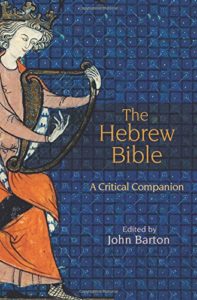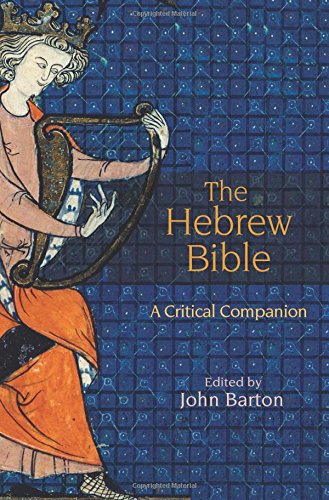 The Hebrew Bible: A Critical Companion, edited by John Barton (Princeton University Press, 2016), 613 pages.
The Hebrew Bible: A Critical Companion, edited by John Barton (Princeton University Press, 2016), 613 pages.
Old Testament (or, Hebrew Bible) introductions generally work book by book to cover the basics and the controversies wrapped up with each biblical book. This unique introduction to the OT works thematically instead. The authors come from various traditions (Judaism, Christianity, and non-religion), but all are specialists in the topic they address. The purpose is to provide an overview of everything important to know about the OT in order to read it carefully and with awareness of the historical, literary, and theological issues.
Contents
Part I addresses the Hebrew Bible in its historical and social context. Barton addresses the identity of the OT (vs. Hebrew Bible), and Stavrakopoulou looks at how the Bible and modernity paints the past. Southwood lays out some of the social and cultural history of ancient Israel, while Frendo overviews Israel in its ANE context. These four essays help the reader become acquainted with many of the modern critical issues involved in reading the OT/HB.
Part II examines the OT by genre, which is a useful methodology. In typical introductions, each chapter on each book in the Writings might, for example, explain elements of poetry in the ANE. This volume avoids the overlap, with chapters on narrative, prophetic books, legal texts, wisdom literature, and psalms and poems. Introducing the student to genre systematically in this way will enable them to become better readers of the OT themselves.
Part III includes major religious or theological themes, such as monotheism, creation, the human condition, the covenants, ethics, religious space and structures, and ritual. Part IV concludes with chapters on the study and reception of the HB. This includes chapters on the reception history of the HB, historical-critical inquiry, literary approaches, theological approaches, political approaches, textual criticism, and Bible translation.
Evaluation
This volume is a useful introduction to the OT in many contexts. Students and scholars at all levels could use these chapters as quick consultation for some of the main evidence involved in the various issues, or for the history of a topic such as historical-critical inquiry. University students will receive a nuanced discussion of the same issues they will discuss in class, and everyone will benefit from the attempt to root the Hebrew Bible in its ANE context. One also cannot dispute the specialization of the authors.
Many Evangelical seminaries, however, will not be very tempted to use this volume in the classroom as a textbook to train future pastors. Essentially, an introduction of this sort from a critical perspective would be contrary to the mission of most Evangelical seminaries, which is to train pastors in a non-historical-critical tradition. There are other introductions that will be more amenable for that goal.
However, for a critical introduction to the OT, I was impressed at its balance and nuance. For example, the chapter on monotheism provides a useful definition of monotheism and distinguishes between Israelite religion and biblical religion, arguing that biblical religion is largely monotheistic. The discussion is more nuanced than in many other works on the theology of the OT. Similarly, the chapter on historical-critical inquiry discusses both the benefits and the deficiencies of the method.
The chapters on genres are incredibly useful for any classroom, since genre is a literary feature that does not bear on one’s theological perspective. Part of reading texts well is understanding its genre in its specific historical context, and this textbook will help all students do that.
In sum, this introduction is unique and useful. The chapters are full of data, organized by experts who are devoted to studying the Old Testament / Hebrew Bible. For critical overviews of most issues involved in reading the Hebrew Bible, this volume is worthy of your attention.
For critical overviews on the Hebrew Bible, this volume is worthy of your attention Click To TweetPreview or buy it here on Amazon.


